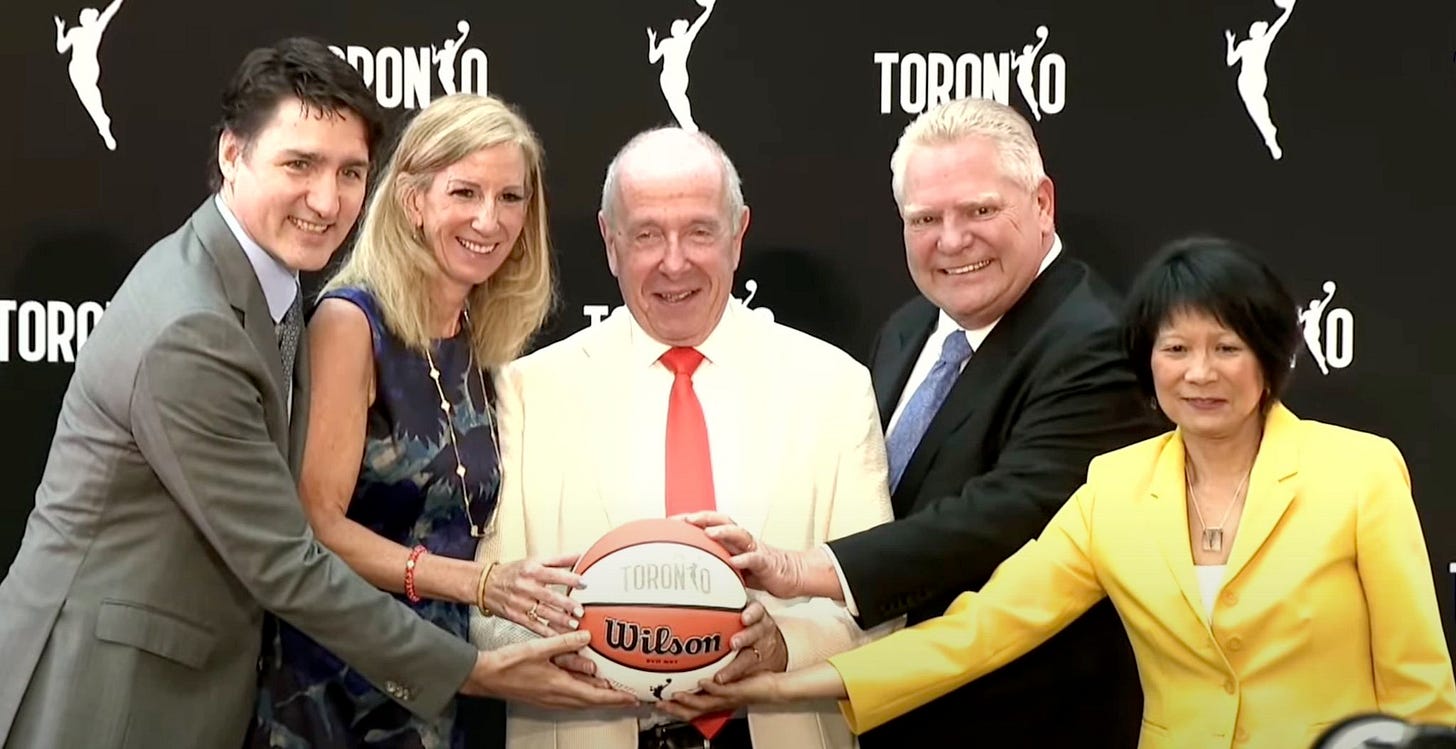The WNBA comes to Toronto, and it's fair to wonder what took so long
Plus, the surprising end of an unbeaten run, yet another NBA coach gets the sack, and the Blue Jays turn back to an old friend

There will come a time in the not-too-distant future where Caitlin Clark and I will both be able to say we have played at the same venue.
The WNBA formally announced on Thursday that it was granting an expansion franchise to Toronto, which was suspected for months and first reported by the CBC a couple of weeks ago. The Toronto team, name and colours TBD, will have as its home arena the Coca-Cola Coliseum on the CNE grounds. It also occasionally hosts beer-league hockey, including my former team, although to considerably smaller crowds than Clark, the budding superstar, is likely to see. (If there is a crowd of one, she wins.)
The WNBA’s big splash is part of what is undeniably a huge moment for women’s sports, with new professional leagues for hockey and soccer, soaring franchise values for some established clubs, and unprecedented interest in certain NCAA sports. Clark’s record-setting run at Iowa was a big part of that, but it wasn’t the sole reason interest in her sport has spiked. There’s been a collective realization that there’s an if-you-build-it-they-will-come thing going on here. That is, broadcasters and other media are discovering that if you give women’s sports a real platform, viewers and readers will consume the coverage.
Which is the other part of the story: This has taken a long while to come to pass. We should all feel kind of stupid about it. The WNBA was founded more than 25 years ago, and while it has had some success stories, it has also struggled to gain relevance for much of that time. Some of its best players would essentially work second jobs by playing overseas when the WNBA season ended because the compensation was better over there. Several played in Russia, where the money was excellent, and some American stars even skipped WNBA seasons because it made more sense financially to stick with a Russian team. (Brittney Griner, a WNBA star who was unjustly imprisoned for months on drug charges, was playing for a Russian team at the time and became a pawn in the diplomatic fight over that country’s attacks on Ukraine.)
One hopes that the new attention on the WNBA, which is now setting viewership records on a seemingly weekly basis, will mean its professionals won’t also have to become overseas mercenaries to make ends meet. This, of course, was a big part of the years-long push for what became the PWHL, now completing its wildly successful first season. Its predecessor leagues were barely semi-pro, and only the players with national team funding could play pro hockey without holding down some other means of employment. The players on those teams always insisted that there was a market for their product if only someone would fund and promote it. Then someone did and there was.
But it’s also worth nothing that the WNBA Toronto owner is Larry Tanenbaum, who went it alone when his MLSE partners, specifically the Rogers part of it, didn’t give their blessing to a WNBA team.
Many more people are now recognizing the growth potential of women’s sports, that is. But not everyone.
Oh, the herzschmerz
The German football team Bayer Leverkusen entered Wednesday’s Europa League final against Italian side Atalanta on a 51-game unbeaten streak, covering almost an entire calendar year.
Leverkusen, known derisively over there as Neverkusen due to their tendency to not win things, rather obviously won the Bundesliga — Germany’s top tier — with that unbeaten record. Sharp-eyed readers may recall that my friend Mark and I saw Leverkusen keep its unbeaten season intact with a late tying goal in the Europa semi-finals against West Ham in London. They were massive favourites against Atalanta, who hadn’t won anything since the 1960s.
But then sports happened. Atalanta came out with their hair on fire (not literally), pressing Leverkusen at every opportunity and not giving them any chance to get settled at all. The Italian club scored after 12 minutes, scored again in the 26th minute, and by the time they added a third in the 70th minute it was obvious that Leverkusen’s invincible season was going to end up just slightly vincible. The German word for heartbreak is herzschmerz, according to Google Translate. I hope that’s true, because it’s a pretty great word.
Department of You Don’t Say
A recent edition of this newsletter noted a curious trend in which two NBA coaches were fired within days of published accounts of internal strife on their teams. Both articles were in The Athletic, which also did the inside-poop job on Cleveland Cavaliers coach J.B. Bickerstaff. He made it about a week after that piece was published, but was fired on Thursday.
That’s three instances, so we can officially call it a trend: leak insidery gossip to The Athletic’s scoop merchant that makes the coach look bad, publish if and when his team is eliminated from the playoffs, and sit back and wait for the scythe to fall.
There are only four teams left in the NBA playoffs at this point, and of them only the Boston Celtics would be likely to consider a coaching change if they don’t win it all. I don’t think we’ll end up with a fourth behind-the-scenes account that precedes a firing, but we’ll see.
Welcome back, old friend
The Blue Jays brought back the Home Run Jacket, and at this point the only question is why didn’t they do it sooner? It’s magic! In my latest over at theScore, I consider the other options available to Jays management if they don’t go on a hot streak, like, now. (Spoiler: The jacket is the best option.)



